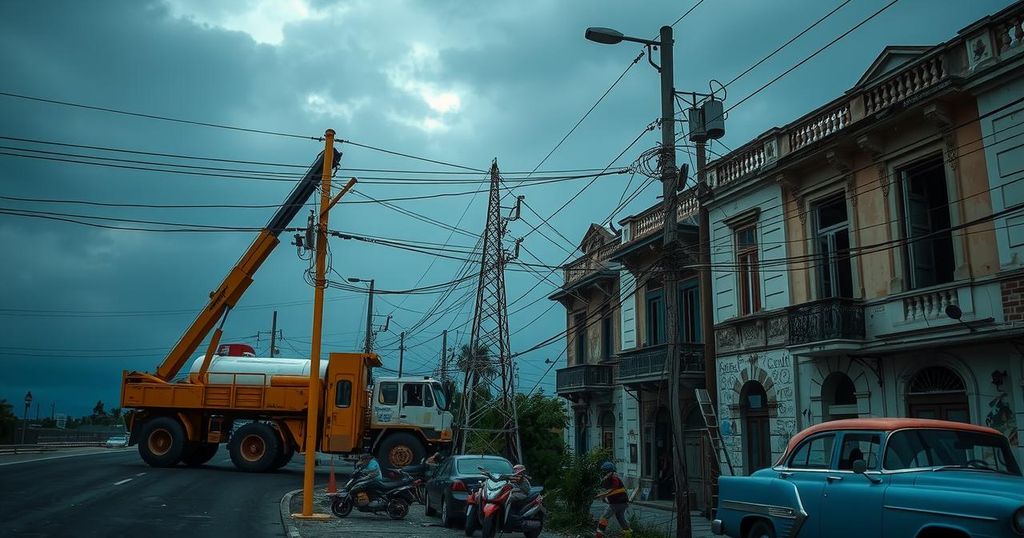Restoration of Power in Cuba Following Tropical Storm Oscar
Cuba has restored power to over 70% of the country following the impact of Tropical Storm Oscar, which caused significant flooding and damage. While the electrical grid stabilization has made headway, some regions remain cut off from power and communications, particularly in eastern provinces affected by the storm. The situation highlights ongoing vulnerabilities in Cuba’s energy infrastructure.
Cuba has made significant strides in restoring electrical power across the nation, particularly in Havana and surrounding provinces, despite ongoing challenges from Tropical Storm Oscar. Initially making landfall near Baracoa as a Category 1 hurricane, Oscar was swiftly downgraded to a tropical storm. However, before losing intensity, it caused extensive damage in eastern Cuba, including downed powerlines, triggering mudslides, and overwhelming rivers with flash floods. The town of San Antonio del Sur suffered catastrophic flooding early on Monday, resulting in the tragic loss of six lives, including a child, as per official reports. Many areas experienced rainfall exceeding 10 inches (25 cm), leading to the inundation of agricultural lands, destruction of banana plants, and significant damage to the region’s valuable coffee crop. Certain districts in Guantanamo remained inaccessible due to swollen rivers and mudslide-blocked roads, hampering recovery and communication efforts. By mid-afternoon on Tuesday, authorities reported a stabilization of Cuba’s electrical grid after various failures since Friday, when the national grid collapsed, leaving 10 million residents without power. On Tuesday, over 70% of Cuba had restored power, with expectations for additional power plants to resume operations shortly. Notably, approximately 90% of electricity clients in Havana had their power restored by midday, largely due to the capital’s minimal impact from Tropical Storm Oscar. The current electricity crisis arises from aging oil-fired power plants and diminishing oil imports from key partners such as Venezuela, Russia, and Mexico, culminating in the recent grid breakdown.
The restoration of power in Cuba comes amidst the aftermath of Tropical Storm Oscar, which led to extensive flooding and infrastructure damage across eastern provinces, particularly affecting rural regions. Historically, Cuba has faced challenges related to its electrical grid, often attributed to outdated technology and external economic factors. The island’s dependency on oil imports has become increasingly precarious, especially with declining supplies from key partner nations, exacerbating the crisis in energy reliability. Understanding the geographical and socio-economic implications of such natural events is crucial, especially in evaluating Cuba’s capacity to respond to disasters and maintain essential infrastructure such as electrical power.
In conclusion, Cuba is currently navigating through the aftermath of Tropical Storm Oscar, which has caused significant disruptions to both power supply and local communities, particularly in eastern regions. While restoration efforts have led to a substantial recovery in electricity provision, challenges remain owing to the impact of the storm and ongoing infrastructural issues. The crisis highlights the vulnerabilities of Cuba’s energy infrastructure, underscoring the need for long-term solutions to enhance resilience against natural disasters in the future.
Original Source: www.westhawaiitoday.com




Post Comment